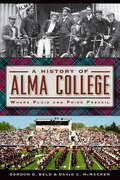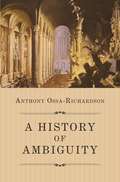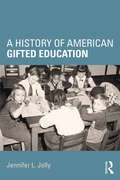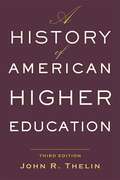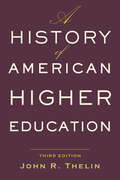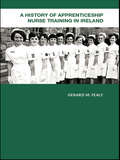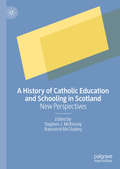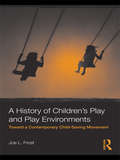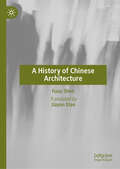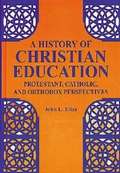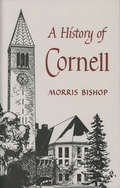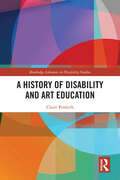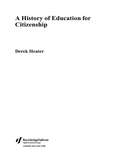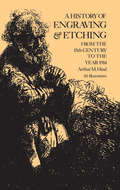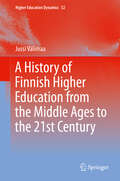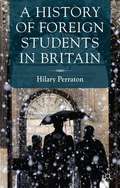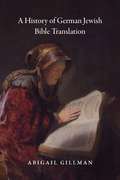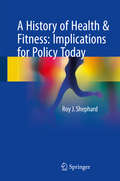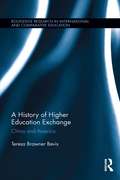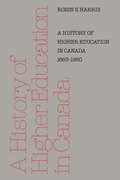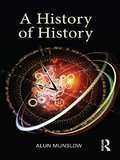- Table View
- List View
A History Of Christian Education
by James E. Reed Ronnie ProvostOurs is an age of rapid change. What is fashionable comes and goes more quickly than ever before. In a world of such rapid change, it's essential to know who you are--to know where you come from, to have your roots go deep. Walking through this book is like going to a large family reunion and meeting for the first time some relatives you didn't know you had. Here in all of its richness and diversity is your family of faith. Of course, the roots of Christian education go deep into the Hebrew heritage. In many ways, Christian education is an extension of Hebrew education.
A History in Sum
by Shing-Tung Yau Steve NadisIn the twentieth century, American mathematicians began to make critical advances in a field previously dominated by Europeans. Harvards mathematics department was at the center of these developments. "A History in Sum "is an inviting account of the pioneers who trailblazed a distinctly American tradition of mathematics--in algebraic geometry and topology, complex analysis, number theory, and a host of esoteric subdisciplines that have rarely been written about outside of journal articles or advanced textbooks. The heady mathematical concepts that emerged, and the men and women who shaped them, are described here in lively, accessible prose. The story begins in 1825, when a precocious sixteen-year-old freshman, Benjamin Peirce, arrived at the College. He would become the first American to produce original mathematics--an ambition frowned upon in an era when professors largely limited themselves to teaching. Peirces successors--William Fogg Osgood and Maxime Bocher--undertook the task of transforming the math department into a world-class research center, attracting to the faculty such luminaries as George David Birkhoff. Birkhoff produced a dazzling body of work, while training a generation of innovators--students like Marston Morse and Hassler Whitney, who forged novel pathways in topology and other areas. Influential figures from around the world soon flocked to Harvard, some overcoming great challenges to pursue their elected calling. "A History in Sum" elucidates the contributions of these extraordinary minds and makes clear why the history of the Harvard mathematics department is an essential part of the history of mathematics in America and beyond.
A History of Alma College: Where Plaid and Pride Prevail (American Chronicles)
by Gordon G. Beld David C. McMackenCome along with authors Gordon Beld and David McMacken on a trip down memory lane to Alma College, a mid-Michigan school with a fascinating past, rich heritage and impressive influence. Look on as thousands of spectators flock to the campus for the annual Highland festival. Sit in the front row while a yet unknown young performer introduces you to a new song, "Take Me Home, Country Roads." Peek into a voting booth to see the ballot listing two former Alma students who are candidates for the U.S. vice presidency--in the same election. Learn how Alma students reached out to make a difference here at home and around the world..
A History of Ambiguity
by Anthony Ossa-RichardsonEver since it was first published in 1930, William Empson’s Seven Types of Ambiguity has been perceived as a milestone in literary criticism—far from being an impediment to communication, ambiguity now seemed an index of poetic richness and expressive power. Little, however, has been written on the broader trajectory of Western thought about ambiguity before Empson; as a result, the nature of his innovation has been poorly understood.A History of Ambiguity remedies this omission. Starting with classical grammar and rhetoric, and moving on to moral theology, law, biblical exegesis, German philosophy, and literary criticism, Anthony Ossa-Richardson explores the many ways in which readers and theorists posited, denied, conceptualised, and argued over the existence of multiple meanings in texts between antiquity and the twentieth century. This process took on a variety of interconnected forms, from the Renaissance delight in the ‘elegance’ of ambiguities in Horace, through the extraordinary Catholic claim that Scripture could contain multiple literal—and not just allegorical—senses, to the theory of dramatic irony developed in the nineteenth century, a theory intertwined with discoveries of the double meanings in Greek tragedy. Such narratives are not merely of antiquarian interest: rather, they provide an insight into the foundations of modern criticism, revealing deep resonances between acts of interpretation in disparate eras and contexts. A History of Ambiguity lays bare the long tradition of efforts to liberate language, and even a poet’s intention, from the strictures of a single meaning.
A History of American Gifted Education
by Jennifer L. JollyA History of American Gifted Education provides the first comprehensive history of the field of gifted education, which is essential to recognizing its contribution to the overall American educational landscape. The text relies heavily on primary documents and artifacts as well as essential secondary documents such as the disparate historical texts and relevant biographies that already exist. This book commences its investigation of American gifted education with the founding of the field of psychology and subsequently gifted education at the early part of the 20th century and concludes just over a century later with the passage of the No Child Left Behind Act in 2001.
A History of American Higher Education
by John R. ThelinColleges and universities are among the most cherished—and controversial—institutions in the United States. In this updated edition of A History of American Higher Education, John R. Thelin offers welcome perspective on the triumphs and crises of this highly influential sector in American life. <P><P> Exploring American higher education from its founding in the seventeenth century to its struggle to innovate and adapt in the first decades of the twenty-first century, Thelin demonstrates that the experience of going to college has been central to American life for generations of students and their families. Drawing from archival research, along with the pioneering scholarship of leading historians, Thelin raises profound questions about what colleges are—and what they should be. <P><P> Covering issues of social class, race, gender, and ethnicity in each era and chapter, this new edition showcases a fresh concluding chapter that focuses on both the opportunities and problems American higher education has faced since 2010. The essay on sources has been revised to incorporate books and articles published over the past decade. The book also updates the discussion of perennial hot-button issues such as big-time sports programs, online learning, the debt crisis, the adjunct crisis, and the return of the culture wars and addresses current areas of contention, including the changing role of governing boards and the financial challenges posed by the economic downturn. <P><P> Anyone studying the history of this institution in America must read Thelin's classic text, which has distinguished itself as the most wide-ranging and engaging account of the origins and evolution of America's institutions of higher learning.
A History of American Higher Education
by John R. ThelinThe definitive history of American higher education—now up to date.Colleges and universities are among the most cherished—and controversial—institutions in the United States. In this updated edition of A History of American Higher Education, John R. Thelin offers welcome perspective on the triumphs and crises of this highly influential sector in American life.Exploring American higher education from its founding in the seventeenth century to its struggle to innovate and adapt in the first decades of the twenty-first century, Thelin demonstrates that the experience of going to college has been central to American life for generations of students and their families. Drawing from archival research, along with the pioneering scholarship of leading historians, Thelin raises profound questions about what colleges are—and what they should be. Covering issues of social class, race, gender, and ethnicity in each era and chapter, this new edition showcases a fresh concluding chapter that focuses on both the opportunities and problems American higher education has faced since 2010. The essay on sources has been revised to incorporate books and articles published over the past decade. The book also updates the discussion of perennial hot-button issues such as big-time sports programs, online learning, the debt crisis, the adjunct crisis, and the return of the culture wars and addresses current areas of contention, including the changing role of governing boards and the financial challenges posed by the economic downturn. Anyone studying the history of this institution in America must read Thelin's classic text, which has distinguished itself as the most wide-ranging and engaging account of the origins and evolution of America's institutions of higher learning.
A History of Apprenticeship Nurse Training in Ireland
by Gerard FealyBased on new research using previously unpublished sources, this compelling text is an in-depth study of the history of nurse education in Ireland, presenting a new authoritative account of the history of the traditional system of training in Ireland. Introduced as part of the reforms of hospital nursing in the late nineteenth century, apprenticeship nurse training was a vocational extension of secondary education. Residing outside the mainstream of higher educational provision it provided nurses with the knowledge and technical skills for sick nursing, whilst also functioning to socialise them into the role of hospital worker and introduce to them nursing’s value systems. This method of training provided a ready supply of skilled, efficient, inexpensive and loyal workers. In a chronological period spanning over a century, the book traces the development of modern nursing in Ireland, bringing the hidden role of nurses and nursing to the fore. It analyzes and describes the development, provision and gradual reform of hospital nursing, taking into account the social, cultural, political and economic factors that led to its establishment, its continuance, and eventual demise.
A History of Badger Baseball: The Rise and Fall of America's Pastime at the University of Wisconsin
by Steven D. SchmittFor more than a century, the University of Wisconsin fielded baseball teams. This comprehensive history combines colorful stories from the archives, interviews with former players and coaches, a wealth of historic photographs, and the statistics beloved by fans of the game. The earliest intercollegiate varsity sport at Wisconsin, the baseball team was founded in 1870, less than a decade after the start of the Civil War. It dominated its first league, made an unprecedented trip to Japan in 1909, survived Wisconsin's chilly spring weather, two world wars, and perennial budget crises, producing some of the finest players in Big Ten history—and more than a few major leaguers. Fan traditions included torchlight parades, kazoos, and the student band playing "A Hot Time in the Old Town Tonight" as early as 1901. There is painful history here, too. African Americans played on Wisconsin's first Big Ten championship team in 1902, including team captain Julian Ware, but there were none on the team between 1904 and 1960. Heartbreaking to many fans was the 1991 decision to discontinue baseball as a varsity sport at the university. Today, Wisconsin is the only member of the Big Ten conference without a men's baseball team. Appendixes provide details of team records and coaches, All Big Ten and All American selections, Badgers in the major leagues, and Badgers in the amateur free-agent draft.
A History of Catholic Education and Schooling in Scotland: New Perspectives
by Stephen J. McKinney Raymond McCluskeyThis book analyses the development of Catholic schooling in Scotland over the course of the nineteenth and twentieth centuries. Scholarship of this period tends to be dominated by discussions of the 1872 and 1918 Education (Scotland) Acts: while these crucial acts are certainly not neglected in this volume, the editors and contributors also examine the key figures and events that shaped Catholic education and Catholic schools in Scotland. Focusing on such diverse themes as lay female teachers and non-formal learning, this volume illuminates many under-researched and neglected aspects of Catholic schooling in Scotland. This wide-ranging edited collection will illuminate fresh historical insights that do not focus exclusively on Catholic schooling, but are also relevant to the wider Scottish educational community. It will appeal to students and scholars of Catholic schooling, schooling in Scotland, as well as Christian schooling more generally.
A History of Children's Play and Play Environments: Toward a Contemporary Child-Saving Movement
by Joe L. FrostChildren’s play throughout history has been free, spontaneous, and intertwined with work, set in the playgrounds of the fields, streams, and barnyards. Children in cities enjoyed similar forms of play but their playgrounds were the vacant lands and parks. Today, children have become increasingly inactive, abandoning traditional outdoor play for sedentary, indoor cyber play and poor diets. The consequences of play deprivation, the elimination and diminution of recess, and the abandonment of outdoor play are fundamental issues in a growing crisis that threatens the health, development, and welfare of children. This valuable book traces the history of children’s play and play environments from their roots in ancient Greece and Rome to the present time in the high stakes testing environment. Through this exploration, scholar Dr. Joe Frost shows how this history informs where we are today and why we need to re-establish play as a priority. Ultimately, the author proposes active solutions to play deprivation. This book is a must-read for scholars, researchers, and students in the fields of early childhood education and child development.
A History of Chinese Architecture
by Fuxu ShenThis book provides a comprehensive examination of the architectural evolution of China from antiquity to the early modern, modern, and contemporary ages. A comprehensive examination of the evolution of Chinese architecture is presented in nine chapters, offering a penetrating survey of the subject matter for both learners and professionals. Each chapter illuminates the architectural styles, cultural implications, social significance, and innovations that have shaped the development of Chinese architecture across all dynasties and epochs, from the prehistoric era to the present day. Furthermore, the book draws on past predictions and promising trends in the future of Chinese architecture, thus offering a distinctive perspective on the history of Chinese architecture.
A History of Christian Education: Protestant, Catholic, and Orthodox Perspectives
by John L. EliasThis text examines major developments in the history of Christian education, and offers a context for understanding contemporary educational efforts among Protetsants, Roman Catholics and Orthodox Christians. It looks at major thinkers, historical events and intellectual movements.
A History of Cornell
by Morris BishopCornell University is fortunate to have as its historian a man of Morris Bishop's talents and devotion. As an accurate record and a work of art possessing form and personality, his book at once conveys the unique character of the early university—reflected in its vigorous founder, its first scholarly president, a brilliant and eccentric faculty, the hardy student body, and, sometimes unfortunately, its early architecture—and establishes Cornell's wider significance as a case history in the development of higher education. Cornell began in rebellion against the obscurantism of college education a century ago. Its record, claims the author, makes a social and cultural history of modern America. This story will undoubtedly entrance Cornellians; it will also charm a wider public.Dr. Allan Nevins, historian, wrote: "I anticipated that this book would meet the sternest tests of scholarship, insight, and literary finish. I find that it not only does this, but that it has other high merits. It shows grasp of ideas and forces. It is graphic in its presentation of character and idiosyncrasy. It lights up its story by a delightful play of humor, felicitously expressed. Its emphasis on fundamentals, without pomposity or platitude, is refreshing. Perhaps most important of all, it achieves one goal that in the history of a living university is both extremely difficult and extremely valuable: it recreates the changing atmosphere of time and place. It is written, very plainly, by a man who has known and loved Cornell and Ithaca for a long time, who has steeped himself in the traditions and spirit of the institution, and who possesses the enthusiasm and skill to convey his understanding of these intangibles to the reader."The distinct personalities of Ezra Cornell and first president Andrew Dickson White dominate the early chapters. For a vignette of the founder, see Bishop's description of "his" first buildings (Cascadilla, Morrill, McGraw, White, Sibley): "At best," he writes, "they embody the character of Ezra Cornell, grim, gray, sturdy, and economical." To the English historian, James Anthony Froude, Mr. Cornell was "the most surprising and venerable object I have seen in America." The first faculty, chosen by President White, reflected his character: "his idealism, his faith in social emancipation by education, his dislike of dogmatism, confinement, and inherited orthodoxy"; while the "romantic upstate gothic" architecture of such buildings as the President's house (now Andrew D. White Center for the Humanities), Sage Chapel, and Franklin Hall may be said to "portray the taste and Soul of Andrew Dickson White."Other memorable characters are Louis Fuertes, the beloved naturalist; his student, Hugh Troy, who once borrowed Fuertes' rhinoceros-foot wastebasket for illicit if hilarious purposes; the more noteworthy and the more eccentric among the faculty of succeeding presidential eras; and of course Napoleon, the campus dog, whose talent for hailing streetcars brought him home safely—and alone—from the Penn game. The humor in A History of Cornell is at times kindly, at times caustic, and always illuminating.
A History of Disability and Art Education (Routledge Advances in Disability Studies)
by Claire PenkethDrawing on recent theoretical frameworks from critical disability studies and art education including normalcy, ableism, disability and Crip theory, this book offers an analysis of the conceptualisation of ability in art education and its relationship with disability. Drawing on the work of Cizek and Lowenfeld in Austria, Ruskin and Richardson in England and Dewey and Eisner in the United States, it critically examines the influence of ideas such as the dominance of vision and visuality; the emergence of psychological perspectives; the Child Art Movement; the implications of assessment regimes; and the relevance of art education as a critical social practice on the production of disability. Offering a sustained inquiry into the differential values attributed to learners and their work and the implications of this for framing our understanding of disability in art education, this book shows that although art educators have frequently advocated for the universal appeal and importance of art education, they have done so within historical contexts that have produced and determined problematic ideas regarding disability. It will be of interest to all scholars and students of disability studies, art in education, art history and education studies.
A History of Education for Citizenship
by Derek HeaterIn this unique examination of education for citizenship, Derek Heater covers two and a half millennia of history encompassing every continent. Education for citizenship is considered from its classical origins through to ideas of world citizenship and multiculturalism which are relevant today. The book reveals the constants of motives, policies, recommendations and practices in this field and the variables determined by political, social and economic circumstances, which in turn illustrate the reasons behind education for citizenship today.Sections covered include:* Classical origins* The age of rebellions and revolutions* Education for liberal democracy* Totalitarianism and transitions* Multiple citizenship education.A History of Education for Citizenship will be of interest to teachers and students of citizenship, particularly those concerned with citizenship education. It will also be of interest to those working in the field of politics of education and history of education.
A History of Engraving and Etching
by Arthur M. HindArthur Mayger Hind (1880–1957) was a leading historian of engraving, one of the most highly respected art historians of modern times. Keeper of Prints and Drawings at the British Museum and Professor of Fine Art at Oxford, he was the author of the most complete history of etching and engraving that has yet been written. This book, formerly out of print for many years, contains references to every etcher or engraver worthy of mention from the early fifteenth century to 1914, and it gives a fair account of influences, artistic repercussions, and accomplishments of each individual.Beginning with a chapter on processes and methods of the twin arts, in which he covers line-engraving, etching, biting and stopping-out, tone processes, the tools used in the various methods, and so on, the author proceeds with a text that is fabled among artists, art historians, teachers, and students for its richness of detail and the brilliance of its author’s obvious genius for research and criticism. He begins with the anonymous engravers of the fifteenth century, moves through Holland, Italy, and Germany to the great masters of engraving and the beginnings of etching in the sixteenth century, through the portrait engravers, master etchers, the practitioners of mezzotint, aquatint, crayon manner and stipple, and color print makers, to modern etching in the period prior to World War I. All along the way there are illustrations: over 100 magnificent works by Dürer, Finiguerra, Cranach, Lucas Van Leyden, Parmigiano, Van Dyck, Rembrandt, van Ruysdael, Blake, Tiepolo, Piranesi, Turner, Boucher, Goya, Millet, Whistler, and scores of others. All but seven of these plates have been reproduced from new photographs and are even sharper and clearer than those in the original editions of Hind's great text.As an aid to students of art history, there is a massive Index of more than 2,500 artists mentioned in the text, with their dates and brief individual biographical data. Furthermore, there is a classified chronological list, arranged by country, of important artists, movements, and styles, and the engravers and etchers who were influenced by them. Finally, there is a bibliography that is valuable for further reference work.
A History of Finnish Higher Education from the Middle Ages to the 21st Century (Higher Education Dynamics #52)
by Jussi VälimaaThis book unravels the origins, continuities, and discontinuities of Finnish higher education as part of European higher education from the Middle Ages to the 21st century. It describes the emergence of universities in the Middle Ages and the Finnish student, and moves on to the Reformation and the end of Swedish rule. It then discusses the founding of the Royal Academy of Turku, its professors and governing bodies, its role as a community, student numbers, the research and controversies. Travelling through the age of autonomy, the first decades of independence and the Second World War, the book examines the expansion of higher education, the development of the system, and the establishment of polytechnics. It concludes by analysing the multiple institutional and organisational layers of Finnish higher education. Altogether, the book offers an historical study that shows how and why education and higher education have been important in the process of making the Finnish nation and nation state.
A History of Foreign Students in Britain
by Hilary PerratonForeign students have travelled to Britain for centuries and, from the beginning, attracted controversy. This book explores changing British policy and practice, and changing student experience, set within the context of British social and political history.
A History of German Jewish Bible Translation
by Abigail GillmanBetween 1780 and 1937, Jews in Germany produced numerous new translations of the Hebrew Bible into German. Intended for Jews who were trilingual, reading Yiddish, Hebrew, and German, they were meant less for religious use than to promote educational and cultural goals. Not only did translations give Jews vernacular access to their scripture without Christian intervention, but they also helped showcase the Hebrew Bible as a work of literature and the foundational text of modern Jewish identity. This book is the first in English to offer a close analysis of German Jewish translations as part of a larger cultural project. Looking at four distinct waves of translations, Abigail Gillman juxtaposes translations within each that sought to achieve similar goals through differing means. As she details the history of successive translations, we gain new insight into the opportunities and problems the Bible posed for different generations and gain a new perspective on modern German Jewish history.
A History of Health & Fitness: Implications for Policy Today
by Roy J. ShephardThis book provides a unique and succinct account of the history of health and fitness, responding to the growing recognition of physicians, policy makers and the general public that exercise is the most potent form of medicine available to humankind. Individual chapters present information extending from the earliest reaches of human history to the present day, arranged in the form of 30 thematic essays covering topics from the supposed idyll of the hunter-gatherer lifestyle and its posited health benefits to the evolution of health professionals and the possible contribution of the Olympic movement to health and fitness in our current society. Learning objectives are set for each topic, and although technical language is avoided as far as possible, a thorough glossary explains any specialized terms that are introduced in each chapter. The critical thinking of the reader is stimulated by a range of questions arising from the text context, and each chapter concludes with a brief discussion of some of the more important implications for public policies on health and fitness today and into the future. The material will be of particular interest to graduate and undergraduate students in public health, health promotion, health policy, kinesiology, physical education, but will be of interest also to many studying medicine, history and sociology.
A History of Higher Education Exchange: China and America (Routledge Research in International and Comparative Education)
by Teresa Brawner BevisWeakened by two Opium Wars and a succession of internal rebellions in the mid-1800s, China’s imperial leaders made a historic decision—to break a tradition of isolation and seek education outside the homeland’s borders. In time, an acquisition of science and technology from the rapidly-industrializing West would enable China to modernize its still-feudal economy and outdated military, thus restoring stability and establishing protection from future foreign encroachment. Today more than 200,000 Chinese are enrolled in colleges and universities across the United States, while the number of Americans choosing to study in China is rising. As we approach mid-century China is assuming a lofty position of world leadership. This book does not attempt to debate or determine the extent to which higher education exchange with the United States has impacted China’s rise . Instead it focuses on the story itself—of Sino-American education trade from its roots in antiquity to the present time—highlighting the people, programs, trials and triumphs that have wrought its extraordinary history. It will offer the first sequential, historically grounded book-length review of Sino-American education exchange that takes the story from its origins to the present day.
A History of Higher Education in Canada 1663-1960
by Robin HarrisThis book traces the development of higher education in Canada, through a detailed description and analysis of what was being taught and of the research opportunities available to professors in the years from 1860 to 1960. Background is provided in the opening chapters of Part I, which outline the origins of post-secondary education in both French and English Canada from 1635 to 1860, and in the parallel chapters of Parts II to V which describe the establishment of new and the growth of existing institutions during the period 1861-90, 1891-1920, 1921-40, and 1941-60. The remaining chapters of each of the book's main divisions present an examination of the curricula in arts and science, professional education, and graduate studies in 1860, 1890, 1920, 1940, and 1960, as well as the conditions pertaining to scholarship and research in these years. The concluding chapter identifies the characteristics which differentiate Canadian higher education from that of other countries. The book includes a full bibliography, an extensive index, and statistical appendices providing data on enrolment and degrees granted. A History of Higher Education in Canada 1663-1960 will be the definitive work in its field, valuable both for the wealth of information and the historical insights it contains.
A History of History
by Alun MunslowIn a provocative analysis of European and American historical thinking and practice since the early 18th century, A History of History confronts several basic assumptions about the nature of history. Among these are the concept of historical realism, the belief in representationalism and the idea that the past possesses its own narrative. What is offered in this book is a far-reaching and fundamental rethinking of realist and representationalist ‘history of a particular kind’ by addressing and explaining the ideas of major philosophers of history over the past three hundred years and those of the key theorists of today. In pursuing this radical analysis, the understanding of history as a narrative is evaluated along with contemporary notions such as the continuing presence of the past and the idea of ‘its lessons’. Written by one of the leading thinkers on the subject, A History of History provides an accessible and radical history of history while offering new insights into the pressing questions of the nature, purpose and function of history. This book is an essential text for all students, teachers and consumers of history.


